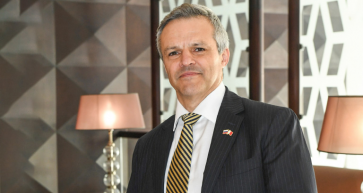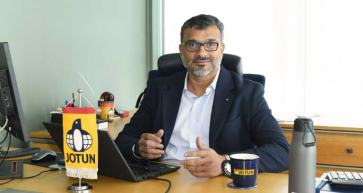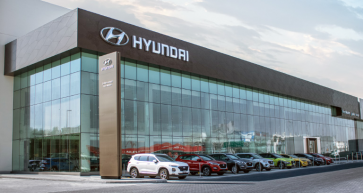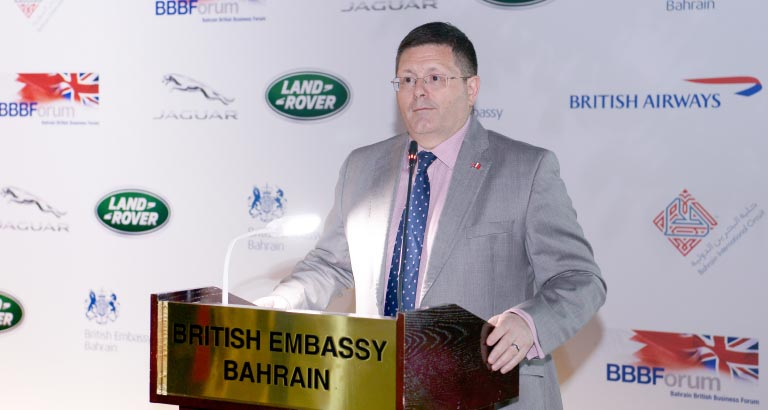
British Ambassador, HE Roddy Drummond, talks crisis management, trade and more.
After eight months in post, how are you finding the role in Bahrain?
I’m really enjoying it and people have been so friendly and so welcoming that the first six months were an absolute joy; getting to know people and seeing collaboration in so many different fields. That’s been really helpful in enabling me to work through the implications of the current crisis because the connections are there.
What are the greatest challenges you’ve faced?
This virus is the biggest challenge that we’ve all faced. It’s a challenge internationally as well individually in different societies; how we deal with it and work through it all. We’re trying to get international action through the G7 and the G20 to help cope with this, across the world. Developed societies like the UK and Bahrain have their own challenges and ways of dealing with it but also have the resources to grapple with it and to engage the right scientists and technology and so on. But, there’s a huge amount of work that we’re all going to have to do internationally to support the developing world as it hits countries in parts of the world that are less able to handle it.
Are there any particular issues requiring action for British residents in Bahrain?
In the short term, I would just say keeping an eye on FCO (Foreign and Commonwealth Office) travel advice and listen to the very good public health advice that’s coming out from the Bahraini Government. Such as, the measures launched now to limit business hours and enforce social distancing. Everyone needs to play their part in that and work together to combat the virus. We’ve been sending out a series of messages on social media to provide information and answer questions. It’s designed to reassure the community that Bahrain continues to be a good place to be.. The embassy is operating, albeit it slightly differently, we’re staying safe and working for home. Our first priority is support for the British community.
How is the embassy supporting the British community in terms of the virus?
I think it’s about the information flow. We’re helped hugely by the fact that the advice that the Bahrain authorities are giving us is very similar to the advice in the UK. We are also able reassure our community, for example, early on in the crisis we were able to clarify with the Bahraini authorities that the health support for anyone that is potentially effected by Covid 19 in Bahrain is available to residents as well as Bahrainis [free], we’re all covered by the same regulations.
We have also been posting answers to a series of FAQs we have been receiving from concerned residents, including a short video featuring embassy colleagues. I have also been coming to grips with technology and filmed a series of info-messages.
You posted a series of videos about your own isolation following your recent trip to the UK, what inspired you to do that? And how did you find your isolation?
I got back two weeks ago and the immigration regulations had just changed as part of the Covid19 measures. I was screened and tested on arrival and asked to self-isolate for 14 days. I realised that many others, including British nationals, were also facing this new requirement and may not have access to as much information as I had on why this was happening. I hope I have been able to reassure the community with regards to the process and ways to occupy yourself in those 14 days. Self-isolation has not stopped me from working, although in a different way. My interactions with colleagues at the embassy were conducted by video conference and telephone, which have since continued as most of the Embassy staff have moved to working remotely from their homes.
I hope they have been well received, we have had some good positive feedback. It has also prompted some good questions that we’ve been able to respond to and answer. The safety and welfare of our British Nationals in Bahrain remains our number one priority and any, and all, engagement from our British nationals is always welcome
There seem to be a lot of British expats leaving the kingdom. Can you share the current numbers?
The current number is around 5,000 to 6,000, which is roughly what it was before. We are aware of a few people who were on short-term contracts or who were out here visiting for business purposes or tourism who have made their way home or making their way home. But that’s relatively small numbers. The vast majority of the settled population have decided to get through the crisis here, which seems to me to be very sensible.
In terms of generally, if you compare numbers to, say, 10 or 20 years ago, yes, there’s probably been a long-term decline in the proportion of Western expats with Bahrainis taking on increasing leadership roles in so many areas and companies such as medical institutions and everything else. So, the number is probably half what it was a decade ago.
What are the current trade figures?
Before the crisis hit, we were looking at going up to 1.5 billion pounds Sterling annually. That’s two-way in goods and services. So, quite a well-balanced trade picture with investments in both directions. It’s growing at about two to three per cent a year in bilateral exchanges. The challenge is to try and take it above that and find new areas of activity that will be mutually beneficial.
We’ve been excited to see areas where British companies can develop Bahrain as a hub for their operations here in the region in fields like logistics and manufacturing. I think there’s scope for more such investments or expansion, in a way tracking some of the things in Vision 2030, the sectors that the Bahrain Government has identified as areas it wants to develop. IT services could be another one and so on.
When I look at things like education, it’s been really good to see more exchanges. Mainly Bahraini students going to the UK to study in big numbers, and so British institutions running courses here, notably the British University of Bahrain (BUB).
The next logical development would be more postgraduate specialist education, beyond the basic undergraduate, in specialised areas like engineering, tech, bio sciences, medical; areas where we’ve got real expertise in the UK.
We’re also looking at renewable energies, how to deal with waste in all different forms and turn that into energy as a resource. Those are the kind of areas where I think the UK can support a range of development – smart development for the rest of the 21st century.
There’s a good synergy between areas where the UK has real expertise and areas where there’s a real need and the opportunity to do things here that achieve success on a national basis. Because of the size of Bahrain one can trial approaches and develop new technologies here and it works for a whole country. That has a really powerful message to then do the same thing, on a bigger scale, in other parts of this region.
Is there any trade investment or cultural news you can share?
I think it’s interesting, at the moment, to see in education that everyone’s having to adapt and work out how to do it. The British council has been teaching online, continuing its courses, which often prepare people for higher education or further education. They’re developing new offers in online education, so that that can continue. Similarly, BUB is teaching online and they will be able to assess students so that they move on at the end of this year. They’re also developing a foundation year course, recognised by most British universities for those going to study in the UK.
British education institutions didn’t want young people to put their lives on hold or have delays in preparation for future studies and future careers.
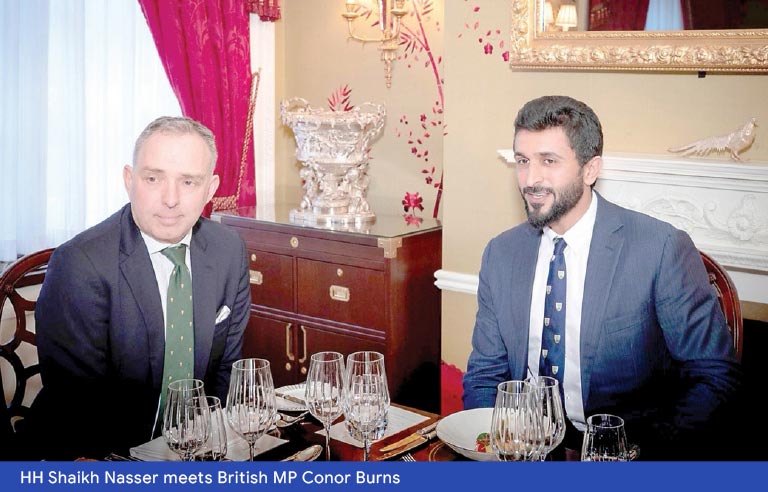 In early March, there were a number of meetings between members of the British Government and their Bahraini counterparts – such as Conor Burns, James Cleverly and the DSAME (Defence Senior Advisor to the Middle East). Can you update us on what was discussed and any plans for increased defence cooperation?
In early March, there were a number of meetings between members of the British Government and their Bahraini counterparts – such as Conor Burns, James Cleverly and the DSAME (Defence Senior Advisor to the Middle East). Can you update us on what was discussed and any plans for increased defence cooperation?
We had a series of meetings in London. Shaikh Nasser, the national security advisor, was visiting and he met a range of decision makers, including our own national security advisor, the minister for the Middle East and other ministers and business partners. They were able to have an exchange on a positive perspective on our intention to develop cooperation across a range of fields – primarily civil. Most of the collaboration we’re looking to develop is in the fields of trade investments, education, research, science, technology, those kind of areas.
There is also some collaboration in the defence side of things; Bahrain occupies a central strategic position, that we very much recognise with our naval support facility here and a naval presence in the Gulf operating out of Bahrain to protect navigation, so, that remains very important. We continue to deepen that collaboration, but I wouldn’t put more emphasis on that. I would say the primary collaborations that we’re going to take forward are going to be in the civil sphere.
There was also an insight into the work of the UK Parliament hosted by the Bahraini Parliament with Alistair Burt, Margaret Curran and Lord Jeremy Purvis. What was the aim of this and how was it received among local members in Bahrain?
This visit formed part of a larger programme we have embarked on, working with an organization that utilizes former UK parliamentarians to support Parliament and Governments overseas. It is an opportunity for the UK to share its knowledge and experience with our Bahraini counterparts, especially as they look to improve and diversify the work they are already doing, including use of its specialist committees and scrutiny of legislation to take forward continuing reforms in Bahrain. This project is still continuing and another example of people being flexible in how they work. We are organising video conferences with some of our partners in parliament later this week. So, if we can’t meet them in person,my team and I at the embassy will still be engaging with them. Work cannot stop completely, but mightslow down a little bit while we work out different ways of collaborating.
Are there any other visits planned?
We were planning some visits at the end of March and in April which we have postponed because of the virus. We’ll look to reinstate those as soon as possible. We also, sadly, had to postpone the Queen’s Birthday Party event in April but we have special dispensation to celebrate Her Majesty’s birthday at some time later.
Bahraini MP Parliamentary Foreign Affairs, Defence and National Security Committee Chairman Mohammed Al Sisi called on the UK to take tougher action against the London-based coalition of Bahraini opposition and other groups such as Al Ashtor and the Al Mokhtar Brigades. What’s been the response?
We take that very seriously. It’s something that the government and the parliamentary officials have asked us to look at. We look very carefully at the activities of any opposition groups from any country in the UK to ensure that they do not break the law in any way. If there was any support towards illegal or prescribed groups or terrorist organisations we investigate closely and would take action accordingly. It is an area that is under constant review.
Anything else to add?
Just that I’m very impressed by the positivity that people are showing in dealing with this. So far, in both my own team and their families and the community that we’re in touch with, people are finding ways to engage positively. It’s bringing people together, friends and families are connecting and staying connected, despite distances and enforced isolation. We’ve got to continue to pull some of the positive things out of this as we work through what’s a very difficult situation because it’s clearly going to be something that we are dealing with for a long time yet. We’re still only at the start of the global pandemic.
But, to finish on a note of humour, in the absence of a visit to the barber’s, I’m considering in a few months’ time, what kind of ponytail I will have – and I will definitely show it off on social media if I don’t get to a barber before then.

